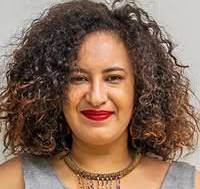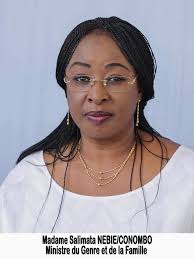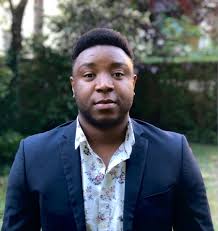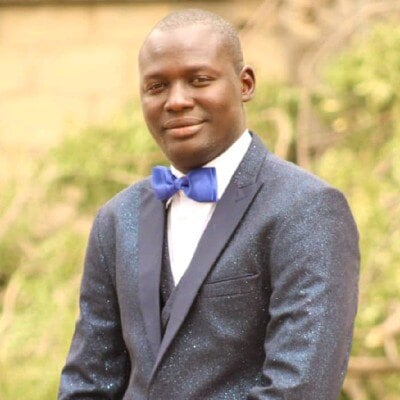June 04 Day

8:00 GMT - Symposium begins
Central Africa (Yaoundé): 9:00 am, East Africa (Nairobi): 11:00 am, Paris: 10:00 am, Washington DC: 4:00 am, China (Beijing): 4:00 pm
Welcome address
Doctor Fadel BAH (University of Ngaoundéré)
Introduction to the day's work
Professor Diane THIOU (University of Lomé)

8:15 GMT - Presentations begin
Central Africa (Yaoundé): 9h15, East Africa (Nairobi): 11h15, Paris: 10h00, Washington DC: 4h15, China (Beijing): 16h15
Axis
Innovation and Inclusion for African Development
ModeratorsDr Diane TCHIOU (University of Lomé)
Doctor Yentiare YOBARE (University of Lomé)
Moderators chat
Rafiatou HASTAHARAM (University of Douala)
Moustapha HOYECK (Howard University)

13:00 GMT - Round table discussions
Central Africa (Yaoundé): 2:00 pm - 4:00 pm, East Africa (Nairobi): 4:00 pm - 6:00 pm, Paris: 3:00 pm - 5:00 pm,
Washington DC: 9:00am - 11:00am, China (Beijing): 9:00pm - 11:00pm
Adeline Boubakar
Presentation themes
Destigmatization and socio-professional integration of people with visual and motor impairments - Prisca WABO GUEMDJOM, Doctoral student in Sociology, University of Dschang (Cameroon)
Contribution of changing Africans' attitudes to mental disorders to Africa's development - Jodelle Victoire KUENBOU DJIOKENG, Doctoral student in sociology, Université de Dschang
African sports and athletes: Showcasing Africa. La jeune fille camerounaise dans une carrière de soccer ; Défis et progrès - Brendaline NGWENGEH BELOKE, PhD in Management Sciences from the University of Buea, Cameroon, specializing in Banking and Finance
Employee share ownership in Africa: a practice worth developing - Meriem El Kerbani, PhD researcher at Hassan II University
Intervenants
Maha Jouini

Author and vice-president of the Agence Francophone et Africaine de l'Intelligence Artificielle, based in Senegal, she holds a master's degree from Tianjin University of Technology and Education (China), specializing in AI and new technologies. She has published several research and analytical articles on AI policy and the future of work in Africa in the AI era. Associate researcher at the Center for AI and Digital Policy (CAIDP).
She holds the position of African Regional Coordinator for the 2023 Global Responsible AI Hackathon, initiated by the Women in AI Ethics initiative.
As an author, lecturer and analyst, her numerous publications and conferences highlight the impact of technology on the African economy and how it can serve as a lever for the inclusion of women and young people. She campaigns for the free movement of people in Africa and for the African Continental Free Trade Area (AfCFTA), offering training sessions to young Africans.
She worked as media assistant for the African Union's campaign to end child marriage in Africa from 2015 to 2017. In 2018, she was named Personality of the Year by "Maghreb Voices" following the success of her book "Lover from Ifrikeya".
In 2022, UNESCO and the Asfari Institute for Civil Society and Citizenship at AUB recognized Maha Jouini as one of 20 women pioneers and change agents in MENA, thanks to her commitment to women's digital rights and economic inclusion, as well as her distinction in the field of artificial intelligence in North Africa.

A human rights activist and board member of Think Tank Burkina International3,4, she was General Secretary until her appointment as Burkina Faso's Minister5 of Family and Gender. Think Tank organizes conferences on civic engagement and social mobilization.
Stéphane Ondo Ze

Dr. ONDO ZE, Expert in Geography | Head of Research at INRAE | Initiator of the African Network of Young Researchers in Land Sciences
Geopolitics and ecology are at the heart of what I do. As a dedicated geographer, I devote my expertise and analysis to the world of research and education, as an active collaborator in the Habiter EA 2076 Laboratory and the Centre d'analyse et d'investigation en géosciences politiques et prospective.
Core competencies:
- Research: As a specialist in data processing and analysis, I have the ability to uncover crucial information and transform it into effective action plans.
- Pedagogy: With solid teaching experience, I master the art of simplifying elaborate concepts while captivating learners' interest.
- Communication: With a talent for written and oral expression, I produce documents of great clarity and precision.
- Project coordination: With a methodical and structured approach, I successfully manage and execute large-scale initiatives.
Notable achievements:
- As a researcher at INRAE, I lead an ambitious project on bioclusters in the Occitanie region.
- As founder and moderator of the Réseau Africain des Jeunes Chercheurs en Sciences du Territoire, I am committed to the advancement of research and sustainability on the African continent.
- Through my YouTube channel "Les Baïs de l'Ogooué", I offer a glimpse of my thoughts and inspirations on themes that are dear to me.
I'm driven by the desire to contribute to innovative initiatives relating to ecology and sustainable development.
I invite you to contact me to discuss my research or future projects.
Makadji Etienne Aquilas

I'm a doctoral student in psychology at the University of Maroua/Cameroon, specializing in neurolinguistic programming (NLP), deradicalization, prison re-education and post-detention support. At the same time, I'm a teacher at the Ecole Normale d'Instituteurs and Coordinator of the Organisation Camerounaise d'Aide à la Réinsertion des Ex-détenus. My professional career has enabled me to acquire in-depth expertise in the field of psychology and social reintegration. I am passionate about my work and committed to providing concrete solutions to help individuals in difficult situations reintegrate into society.
Daily workshops

8:00 - 10:00 GMT - Leveraging Strategic Collaborations, Institutional Partnerships, and Innovation in Higher Education for Sustainable Development in Africa
Central Africa (Yaoundé): 9:00 AM - 11:00 AM, East Africa (Nairobi): 11:00 AM - 1:00 PM, Paris: 9:00 AM - 11:00 AM, Washington DC: 3:00 AM - 5:00 AM, China (Beijing): 4:00 PM - 6:00 PM

6:00 pm - 8:00 pm GMT - Data collection and management
Central Africa (Yaoundé): 19h-21h, East Africa (Nairobi): 21h-23h, Paris: 20h-22h, Washington DC: 14h-16h, China (Beijing): 02h-04h

6:00 pm - 8:00 pm GMT - Writing and publishing in research: choosing scientific blogs
Central Africa (Yaoundé): 19h-21h, East Africa (Nairobi): 21h-23h, Paris: 20h-22h, Washington DC: 14h-16h, China (Beijing): 02h-04h

6:00 pm - 8:00 pm GMT - Designing and writing your research project
Central Africa (Yaoundé): 19h-21h, East Africa (Nairobi): 21h-23h, Paris: 20h-22h, Washington DC: 14h-16h, China (Beijing): 02h-04h




